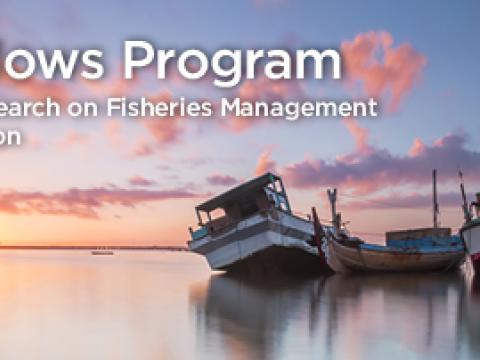The Final Touch: Writing Workshop for Marine Fellowship Program
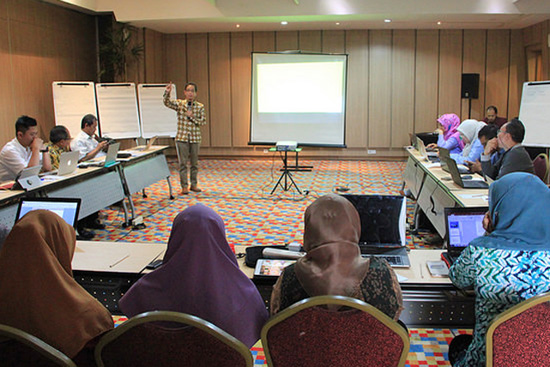
Luky Adrianto, Dean of Faculty of Fisheries and Marine Science of IPB Bogor, giving an opening speech during the workshop. Photo credit: Imanda Pradana.
The Marine Fellowship Program (MFP), which started in early 2017, is nearing completion. The six selected fellows have conducted economic research on topics related to fisheries management and marine protected areas in Indonesia. The dissemination of their findings is scheduled for September 2018 when all the fellows will present their findings to the public. These presentations will serve as powerful policy recommendations for the relevant ministries.
In the lead up to the final presentations of results, CSF-Indonesia conducted a writing workshop where all the fellows had an opportunity to work with with their mentors and to produce a concrete plan for finalizing their reports. All six fellows, their research teams and mentors participated in the two-day event on May 21-22 2018.
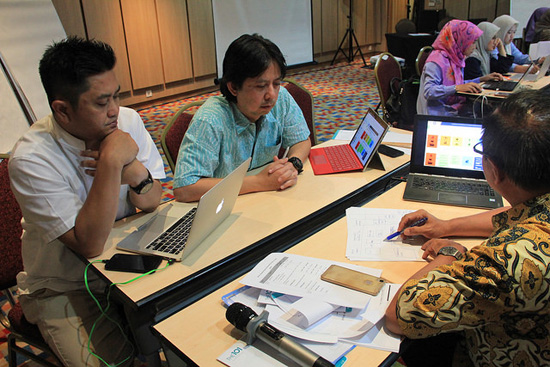
Two fellows consulting with Mubariq Ahmad, CSF-Indonesia Director. Photo credit: Imanda Pradana.
Prior to the workshop, the fellows were required to submit the final drafts of their research papers to be reviewed by their mentors. On the first day of the workshop, the fellows presented their preliminary results and explained the challenges they faced in the analysis and writing process. Due to the interdisciplinary nature of their research, and the complex issues they are studying, it’s not surprising that heated discussions often arise. One example that came up during the workshop was related to the issue of banning cantrang - a kind of Danish seine net - in the Northern Sea of Java. From an ecological perspective, the persistent use of cantrang can be detrimental to the ecosystem in the long term, so the ban seems like a smart move towards sustainable management of the fisheries in the region. However, it is difficult for fishermen to shift to a different type of fishing gear or find another source of income as using cantrang is the only way they know how to catch fish and earn a living. So, from a social perspective, banning this type of net has serious implications for the local community’s livelihood.
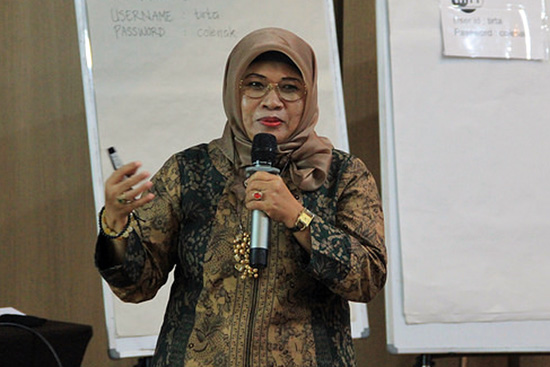
A fellow from Raja Ali Haji Maritime University, Khodijah, presenting her preliminary research findings to the fellows and mentors. Photo credit: Imanda Pradana.
It is often said that natural science is an entirely a different discipline from social science - especially economics - and yet they are undeniably intertwined. The MFP aims to bridge that perceived gap and bring balance between economics and natural resource conservation. It has been very encouraging to see the fellows and their teams, mostly consisting of those who come from different backgrounds like fisheries biology, fisheries law, fisheries economics, and fisheries governance, are producing very thorough research papers together. Merging people from different backgrounds has actually been one of the most positive outcomes of the fellowship program. Their reports have benefitted from the fellows ability to access the perspectives of different disciplines with ease. This has brought much needed balance to their work as they weigh all the aspects of sustainability.
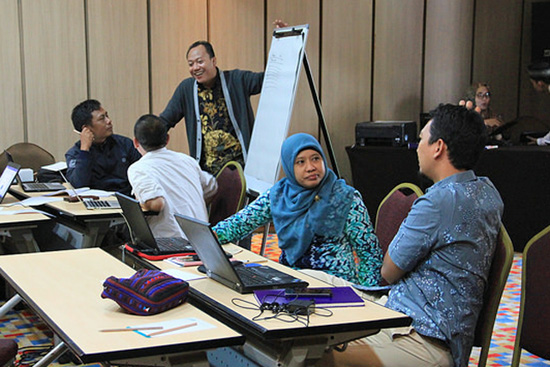
Participants discussing with team members and mentors. Photo credit: Imanda Pradana.
As a result of revising for two days nonstop, all the fellows came away from the workshop with a clear idea of how to interpret their findings into relevant policy recommendations. Even more exciting, in addition to presenting their research at the dissemination in September, all fellows have planned to conduct a workshop at their respective research sites. This will allow their research to help local governments and communities address complex issues using robust economics analysis.
This work was made possible with generous funding from Margaret A. Cargill Philanthropies and The David and Lucile Packard Foundation.
Goresan Terakhir: Lokakarya Penulisan bagi para fellow Marine Fellowship Program
Marine Fellowship Program, atau disingkat MFP, yang dimulai pada awal 2017 akan segera berakhir pada tahun 2018 ini. Tujuan program ini adalah untuk mendukung enam orang fellow dalam mengembangkan penelitian mereka mengenai ekonomi yang berhubungan dengan pengelolaan perikanan dan Kawasan Konservasi Perairan. Jadwal untuk diseminasi akhir telah ditetapkan yaitu pada bulan September 2018 dimana para fellow akan mempresentasikan hasil studi mereka kepada publik yang nantinya bisa digunakan sebagai rekomendasi kebijakan bagi kementerian terkait.
Sebagai rangkaian dari persiapan diseminasi akhir, CSF-Indonesia memutuskan untuk mengadakan sebuah lokakarya penulisan dimana para fellow dapat berkumpul dengan masing-masing timnya dan juga dengan mentornya. Lokakarya ini dilaksanakan pada tanggal 21-22 Mei 2018 di The 101 Hotel Bogor.
Sebelum lokakarya diadakan, para fellow diwajibkan untuk menyerahkan draft penulisan mereka terlebih dahulu kepada para mentor untuk dikaji. Pada hari pertama, seluruh fellow mempresentasikan hasil penemuan studi awal mereka sekaligus menjelaskan kesulitan-kesulitan apa saja yang harus mereka hadapi dalam proses penulisan. Karena banyak sekali unsur interdisipliner dan kompleksitas dalam studi mereka, maka tidak mengherankan jika acapkali terjadi perdebatan yang cukup sengit diantara para fellow dengan timnya. Salah satu contohnya adalah studi salah satu fellow yang berfokus pada dampak cantrang. Jika dilihat dari perspektif konservasi lingkungan, maka keberadaan beberapa jenis cantrang yang dimodifikasi dapat merugikan ekosistem laut dalam jangka panjang. Dasar itu menjadi kebijakan Kementerian Kelautan dan Perikanan sekarang untuk melarang keberadaan cantrang di beberapa daerah. Namun lebih jauh dari itu, karena dinamika sosial yang begitu kompleks, maka sangat sulit bagi para nelayan cantrang untuk berubah haluan dan beradaptasi dengan alat tangkap yang baru ataupun untuk mencari sumber penghasilan alternatif lainnya. Maka dari itu, jika dilihat dari perspektif sosial, maka pelarangan cantrang berdampak besar terhadap kondisi sosial-ekonomi masyarakat nelayan lokal.
Seperti yang kita ketahui, ilmu pengetahuan alam dengan ilmu pengetahuan sosial merupakan dua disiplin ilmu yang sama sekali berbeda, namun memiliki keterikatan yang sangat erat diantara keduanya. Program MFP ini mencoba untuk menjembatani kedua disiplin ilmu tersebut serta berupaya dalam menyeimbangkan antara tujuan konservasi dengan tujuan sosial-ekonomi. Banyak terdapat hal-hal positif yang bisa diambil dari program MFP ini, salah satunya adalah kecenderungan para peneliti yang dapat berkompromi dengan anggota-anggota timnya yang berasal dari disiplin ilmu yang berbeda untuk dapat menghasilkan suatu tulisan yang terperinci serta komprehensif. Perbedaan latar belakang disiplin ilmu bukanlah menjadi masalah bagi mereka, melainkan suatu hal yang sangat wajar dan justru digunakan untuk memperkaya isi studi mereka.
Pada akhir lokakarya penulisan selama dua hari tersebut, para fellow memiliki gambaran yang lebih jelas dalam proses finalisasi penulisan mereka dan bagaimana cara menginterpretasi hasil studi mereka untuk bisa dijadikan rekomendasi kebijakan. Lebih menariknya lagi, para fellow dengan antusias berinisiatif untuk melakukan lokakarya dalam skala lokal di setiap wilayah penelitian mereka masing-masing dengan tujuan pemberian dukungan bagi para pengambil keputusan di tingkat lokal dalam menyelesaikan permasalahan pengelolaan perikanan di daerah mereka masing-masing dengan menggunakan perangkat ekonomi.
Program ini sepenuhnya didukung oleh donasi dari Margaret A. Cargill Philanthropies dan The David and Lucile Packard Foundation.
- Log in to post comments

